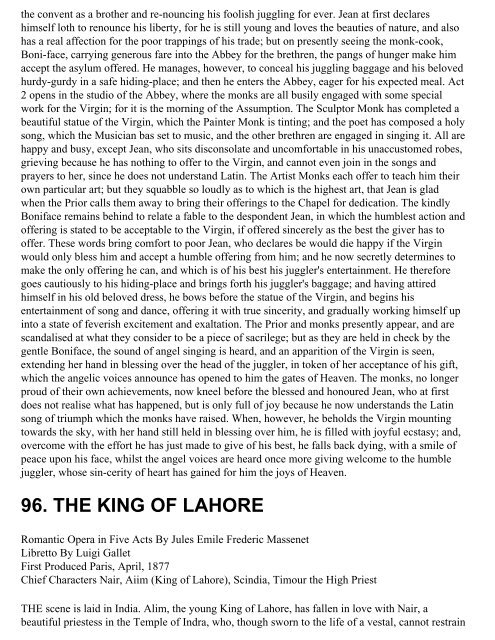Opera Plots I - MDC Faculty Home Pages
Opera Plots I - MDC Faculty Home Pages
Opera Plots I - MDC Faculty Home Pages
You also want an ePaper? Increase the reach of your titles
YUMPU automatically turns print PDFs into web optimized ePapers that Google loves.
the convent as a brother and re-nouncing his foolish juggling for ever. Jean at first declares<br />
himself loth to renounce his liberty, for he is still young and loves the beauties of nature, and also<br />
has a real affection for the poor trappings of his trade; but on presently seeing the monk-cook,<br />
Boni-face, carrying generous fare into the Abbey for the brethren, the pangs of hunger make him<br />
accept the asylum offered. He manages, however, to conceal his juggling baggage and his beloved<br />
hurdy-gurdy in a safe hiding-place; and then he enters the Abbey, eager for his expected meal. Act<br />
2 opens in the studio of the Abbey, where the monks are all busily engaged with some special<br />
work for the Virgin; for it is the morning of the Assumption. The Sculptor Monk has completed a<br />
beautiful statue of the Virgin, which the Painter Monk is tinting; and the poet has composed a holy<br />
song, which the Musician bas set to music, and the other brethren are engaged in singing it. All are<br />
happy and busy, except Jean, who sits disconsolate and uncomfortable in his unaccustomed robes,<br />
grieving because he has nothing to offer to the Virgin, and cannot even join in the songs and<br />
prayers to her, since he does not understand Latin. The Artist Monks each offer to teach him their<br />
own particular art; but they squabble so loudly as to which is the highest art, that Jean is glad<br />
when the Prior calls them away to bring their offerings to the Chapel for dedication. The kindly<br />
Boniface remains behind to relate a fable to the despondent Jean, in which the humblest action and<br />
offering is stated to be acceptable to the Virgin, if offered sincerely as the best the giver has to<br />
offer. These words bring comfort to poor Jean, who declares be would die happy if the Virgin<br />
would only bless him and accept a humble offering from him; and he now secretly determines to<br />
make the only offering he can, and which is of his best his juggler's entertainment. He therefore<br />
goes cautiously to his hiding-place and brings forth his juggler's baggage; and having attired<br />
himself in his old beloved dress, he bows before the statue of the Virgin, and begins his<br />
entertainment of song and dance, offering it with true sincerity, and gradually working himself up<br />
into a state of feverish excitement and exaltation. The Prior and monks presently appear, and are<br />
scandalised at what they consider to be a piece of sacrilege; but as they are held in check by the<br />
gentle Boniface, the sound of angel singing is heard, and an apparition of the Virgin is seen,<br />
extending her hand in blessing over the head of the juggler, in token of her acceptance of his gift,<br />
which the angelic voices announce has opened to him the gates of Heaven. The monks, no longer<br />
proud of their own achievements, now kneel before the blessed and honoured Jean, who at first<br />
does not realise what has happened, but is only full of joy because he now understands the Latin<br />
song of triumph which the monks have raised. When, however, he beholds the Virgin mounting<br />
towards the sky, with her hand still held in blessing over him, he is filled with joyful ecstasy; and,<br />
overcome with the effort he has just made to give of his best, he falls back dying, with a smile of<br />
peace upon his face, whilst the angel voices are heard once more giving welcome to the humble<br />
juggler, whose sin-cerity of heart has gained for him the joys of Heaven.<br />
96. THE KING OF LAHORE<br />
Romantic <strong>Opera</strong> in Five Acts By Jules Emile Frederic Massenet<br />
Libretto By Luigi Gallet<br />
First Produced Paris, April, 1877<br />
Chief Characters Nair, Aiim (King of Lahore), Scindia, Timour the High Priest<br />
THE scene is laid in India. Alim, the young King of Lahore, has fallen in love with Nair, a<br />
beautiful priestess in the Temple of Indra, who, though sworn to the life of a vestal, cannot restrain













